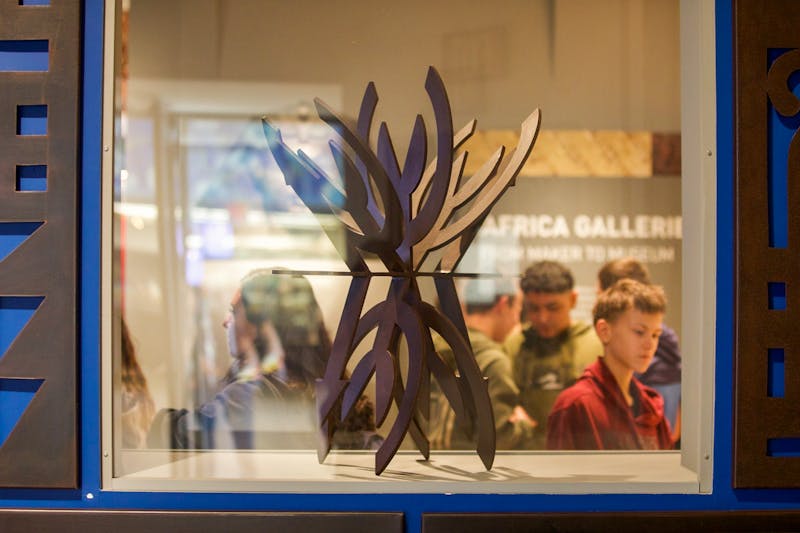
Perusing the exhibits, clipboards and pencils in hand, the judges of the science fair last Friday were very concerned about doling out bad grades to the presenters.
Yet, these judges were shorter than five feet and less than half the age of those being evaluated.
Approximately 140 third- and fourth-grade students came to the Biomedical Research Building for the day to learn about neuroscience and to judge presentations given by graduate and undergraduate students as part of the Kids Judge! Neuroscience Fair.
The event was designed to teach children from the community about the brain and to give Penn students the experience of taking complicated scientific concepts and communicating them to the lay public.
"I learned that really complicated subjects can be distilled to one take-home message, and if you start from there, you can build on that," Neuroscience graduate student Arati Kreibich said.
The students of Penn Alexander and Henry C. Lea schools in West Philadelphia were guided by volunteers through 12 exhibits developed by teams of Penn graduates and undergraduates.
West Philadelphia students and teachers said they both enjoyed and learned from the event.
"It was really well designed," Penn Alexander teacher Michele Dixon said. "The activities were excellent."
The exhibits covered sensory processes, brain differences between people and animals, signal transmission in the nervous system and memory.
All of the exhibits were designed to be interactive, and many used physical activities --such as games and relay races -- to demonstrate how the brain works.
"It was amazing how much they absorbed that we didn't expect them to," College senior Carrie McCloskey said.
The exhibits were screened before the fair so that Penn faculty members and teachers from the two local schools could give suggestions on how to better communicate the ideas to young children.
At the end of the fair, kids had the opportunity to vote on their favorite exhibit, with four receiving award certificates.
One exhibit that won, Synaptic Land, was like the board game Hungry Hungry Hippos, but for brain cells called neurons. The board functioned as the space between two neurons -- called a synapse. In the brain, cells release chemical transmitters that bind to receptors on neighboring cells. To model this, children on one side of the board released the transmitter -- represented by plastic balls -- while kids on the other side tried to scoop as much transmitter as they could into the receptors.
When Synaptic Land was presented at the initial screening, ping pong balls were bouncing all over the floor and professors were pointing out that the transmitters were incorrectly going into the postsynaptic cell instead of binding to receptors on the cell.
"I don't want to have to correct these kids if I see them in [Biology] 251," Biology professor Ted Abel said.
At the fair, the game was much more stable, and the kids demonstrated that they understood the concepts by correctly answering questions about the exhibits.
The Penn students have been working on their projects since February, but preparation for the event started well before that.
"I talked it up in every class I could," said Director of Biological Basis of Behavior Steven Fluharty, who also visited similar fairs held at other universities.
Provost Robert Barchi said that the event was made possible by an "incredible cross-section of the University," which included undergraduates, graduate students, faculty and campus service organizations. "This is a microcosm of what the institution should be," Barchi said.
A major theme of the day was the reciprocal nature of teaching and learning.
"The model of education is a continuum," Deputy Provost Peter Conn said. Undergraduates "are taught both by faculty and the faculty of the next generation."
In many ways, the grade-schoolers were teaching the professors.
"Kids serve an important role in helping us learn to be better teachers," Fluharty said.
Although the fair was the first of its kind to be held at Penn, those involved in the program applauded the administration's support and involvement.
"This is one of the best I've seen in terms of integration at all different levels," said Deborah Colbern, member of the National Kids Judge! Partnership.
The event's primary sponsor was Penn's Mahoney Institute of Neurological Sciences.
Kids Judge! Neuroscience fairs have been held at universities across the country for over 10 years and are funded by a grant from the National Institute on Drug Abuse.
Six of the participating undergraduates present their projects at the annual Society for Neuroscience Conference.
The Daily Pennsylvanian is an independent, student-run newspaper. Please consider making a donation to support the coverage that shapes the University. Your generosity ensures a future of strong journalism at Penn.
DonatePlease note All comments are eligible for publication in The Daily Pennsylvanian.







